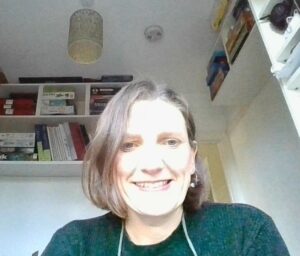by Rachel Wallis Curriculum Tutor PGCE (Primary)
As a former primary teacher, now teacher educator, I still see myself as a teacher and when I began my PhD I was determined my research should be practical, purposeful, involving both pupil and practitioners.

My design research focuses on measures as a context for learning the multiplicative relationship. Though the concept of number has evolved from measurement contexts, which necessitate quantification, curricula typically introduce number concepts and measurement skills separately. My research involves the development of tasks for 6–7-year-olds involving weighing, capacity and length to establish the concepts of multiplication and division. For example, when presented with a huge jug of water and a tiny cup, learners can be asked to find out how many cups fill the jug. Realising tiny cups are inefficient, with a larger cup visible, they can be challenged to suggest a better way. Through establishing a relationship between the tiny cup and a larger cup, a multiplicative relationship can be established between the cups and the jug.
Teachers design and evaluate tasks for learners every day but the efficacy of tasks in mathematics education is frequently criticised. Wittman (2021, p.87) suggests that mathematics education is a ‘design science’ reliant on meaningful, coherent tasks for learner engagement; he even controversially suggests that the design of substantial teaching units should not be ‘left to the teachers’, but rather to ‘experts’. However, to what extent am I expert in designing and evaluating tasks? I have certainly gained understanding of how measures can be used to support the learning of the multiplicative relationship, but teachers are also experts, in what they teach and in understanding the learners and their prior experiences. Furthermore, learners are also experts in their own experiences.
In phase 1 of my design research, I interviewed teachers to gain insight into learners’ typical experiences with the multiplicative relationship and with measures. I undertook pre-assessment tasks with learners. These supported the design of tasks, implemented, by me, with a group of eight learners. In implementation and analysis, I reacted both as teacher and researcher. My supervisors commented on my tendency to be too self-critical in my analysis. Originally, I had planned to seek teacher perspectives on the tasks, but the location of the research sessions, and school closures due to Covid-19 a week after the research took place, meant this was not possible. However, learners’ post-task interview comments proved invaluable in helping me to understand efficacy of tasks; their comments suggested that some tasks allowed numerical relationships to be visualised more easily. Analysis of such learner comments supported me to separate my feelings as a teacher from my findings as a researcher; I feel sure that teacher views of tasks would have been equally beneficial.
As I redevelop the tasks, and plan future phases, I wonder how I can harness opportunities to involve others, and I wonder how I can separate my own teacher reflections, including the tendency to be very self-critical, from my researcher analysis – or should I?

Rachel Wallis is a primary Curriculum Tutor on the PGCE Programme at the Open University in Wales. She joined the Open University in September 2020. She is currently undertaking her PhD: A design-based research project to develop and evaluate materials for teaching multiplicative reasoning through measures.